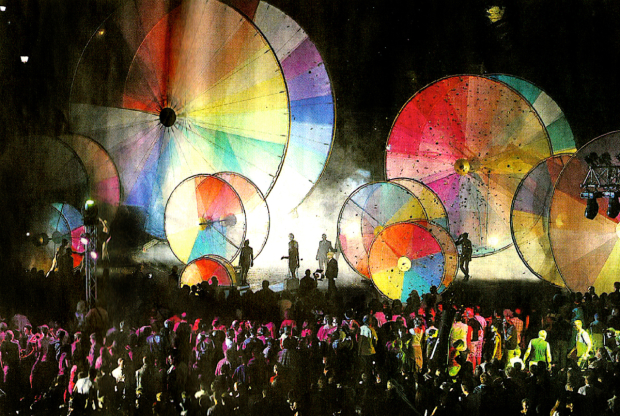Review: A View from the Bridge (Greenwich and Docklands International Festival)
Plays are porous. They soak up their surroundings. Arthur Miller‘s docklands drama is not just a neat fit for Greenwich’s outdoor festival, playing out on the water’s edge across from Canary Wharf, it’s a neat fit for now. Time and place tease out new meanings.
It is only three years since Ivo van Hove‘s definitive, Young Vic A View from the Bridge; two since it wound up in the West End. It still looms large even now, an indelible impression left behind. The ghost of it hovers over Belgian ensemble de Roovers’ bare-stage, modern dress revival. Mark Strong seems to skulk through the middle of the action, clenched tight with jealousy. Phoebe Fox’s Katherine breezes in, and Nicola Walker’s Bea looks on, still horrified, ashamed and alone. It’s not fair, but it’s true. This revival suffers by comparison – not the same pressure cooker, not the same tragic force. How could it not?
The stage is a dusty car lot on the Greenwich Peninsula. Across the water, Canary Wharf’s glassy towers stand in for Manhattan. Its cranes double up as the Red Hook docks. On a square of red tiles, Robbie Cleiren’s Eddie Carbone stares into space, hands in his pockets, unshaven; a shrug of a man. He won’t meet his wife’s eyes, nor look at his niece, Catherine (Sofie Sente). Again and again, he retreats to the water’s edge, kicking up dirt and throwing stones at the horizon. He is lost long before he loses control.
Van Hove’s production played out against austerity. Eddie seemed a breadwinner under the cosh, working himself to death and still struggling to get by. De Roovers' chimes with a new political reality – that of Brexit and the backlash against globalisation. You hear Eddie’s work, unloading cargo crates, anew – not just backbreaking labour, but handling exotic imports. It brings fresh coffee into the country, but big spiders too.
Immigration comes right to the fore. Where Miller’s play usually hones in on Eddie’s warped relationship with his niece, here the emphasis falls, far more than usual, on the two new arrivals in the Carbone house, Marco and Rodolpho. Adriaan Van den Hoof stresses the stark realities of economic migration – the sheer paucity of life back in Italy, the distance from one’s family. Wouter Hendrickx, meanwhile, shows a young man assimilating bit by bit. He returns one day with new cowboy boots.
Against this, Cleiren’s Eddie stands for a supplanted working class – those that stand to lose out. He is out-worked by Marco, "strong as an ox" and determined as hell, and out-sexed by Rodolpho. When the dance comes, one takes his niece’s hand, the other his wife’s. Eddie is emasculated in his own home. His red chair, the only prop on stage, is dearly in need of repair. So, in his own way, is Eddie. In the distance, a phonebox is lit up throughout: the hotline to immigration officials is a constant temptation.
Played outdoors, what the action loses in subtlety, it gains in atmosphere. A three-piece house band instil a swaggering street jazz beat, and the play resonates with the wealth of the Wharf and the romance of the water. It stops to let planes fly noisily overhead and party boats pass by. All this is somehow implicated in the tragedy and, when it finally comes, seagulls fly overhead, as if on cue.
A View From the Bridge runs at Peninsula Quays as part of Greenwich and Docklands International Festival until 8 July.











